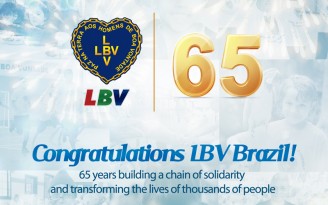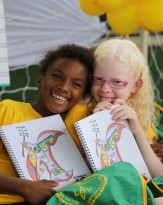
At the center of the Global Agenda
For the executive director of UN Women, now is the time to take bold steps towards gender equality.
By the Editorial Staff
Monday | March 09, 2015 | 2:42 PM | Last update: September 22, 2016, 4:07 PM (Brasilia time)
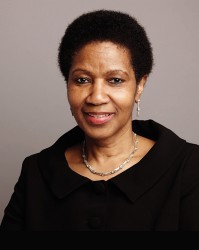
Since she took over as the Executive Director of UN Women almost two years ago, Phumzile Mlambo-Ngcuka has led the entity with all her experience with women’s rights and her strong strategic leadership and management practice. In May 2014, at the launch event of the Beijing+20 international campaign titled “Empowering Women, Empowering Humanity: Picture it!”, she pointed out that we are at an unprecedented moment in History, in which joint efforts are being made in order to achieve the Millennium Development Goals (MDGs) by 2015 and to define the next set of world goals: the Sustainable Development Goals (SDGs). For this reason she stressed that, “we must seize this once-in-a-generation opportunity to position gender equality, women’s rights, and women’s empowerment at the center of the global agenda.”
Phumzile’s résumé includes a remarkable career in politics in South Africa, her homeland and where she became the first woman to be made Vice President from 2005 until 2008. She became a member of Parliament in 1994 and presided the Committee on Public Services and Administration. She was also Deputy Minister of the Department of Trade and Industry (1996- 1999), Minister of Minerals and Energy (1999-2005), and acting Minister of Arts, Culture, Science, and Technology (2004). In 2008 she established the Umlambo Foundation aimed at providing support for schools in poor areas in South Africa, by means of guidance and teacher training, and in Malawi, where it helps bring about improvements in educational establishments through support from local partners.
In an exclusive interview with GOOD WILL magazine the executive director talked, among other topics, about the 20th anniversary of the Fourth World Conference on Women, which took place in Beijing (China) in 1995, and which will be celebrated during the 59th Session of the Commission on the Status of Women (CSW), to be held between March 9 and 20 this year at the United Nations Headquarters in New York (USA). According to Ms. Mlambo-Ngcuka, this is the ideal moment to be moving boldly towards gender equality and empowerment of women, thus shortening the deadline for the implementation of the Beijing Platform for Action, so that women and girls have equal rights with men, freedom, and opportunities in all sectors of life.
GOOD WILL — What have been the major advances in the fight for gender equality since the Fourth World Conference on Women?
Mlambo-Ngcuka — We have made significant strides in the last 20 years. There is more awareness now than ever before of the need for women to be fully involved as equal partners in all spheres of economic social and political participation. New laws and policies have been adopted to promote gender equality in all realms of public and private activity. Significant advances have been made in the global policy agenda on involving women in peace and security efforts globally. We are close to achieving gender parity in primary education, and in most regions, there are now more women than men enrolled in universities. Despite these achievements . . . , one out of three women experience sexual violence, or they have been abused by their partner. Women continue to bear the brunt of unpaid care work and remain utterly underrepresented in decision-making, both in the public sphere and in the private sector—they are still paid 10 to 30 percent less than men and concentrated in vulnerable, informal jobs, and only one in five parliamentarians are women.
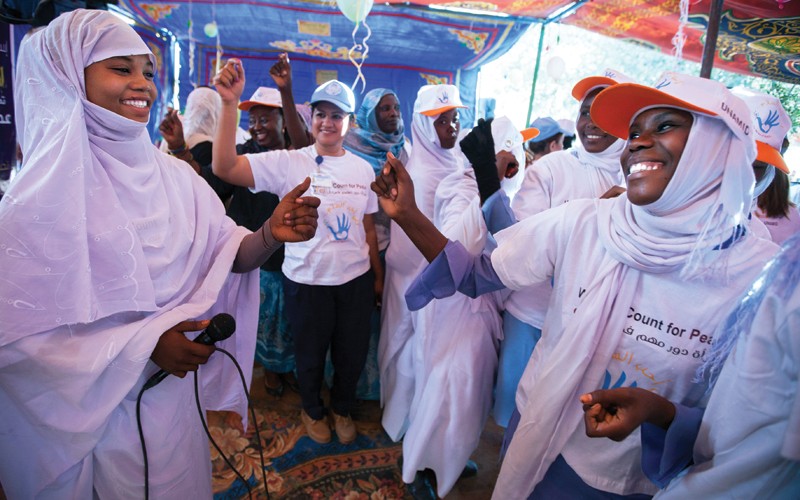
GW — What is the biggest concern for the agenda of UN Women for development post-2015?
Mlambo-Ngcuka — While the Millennium Development Goals spurred significant progress and triggered global attention and action, they yielded uneven results and did not go far enough in addressing key structural issues. For example, the MDG on gender equality and women’s empowerment did not cover fundamental issues such as women’s right to own property, the unequal division of household and care responsibilities, women’s sexual and reproductive health and rights, violence against women and girls, and women’s low participation in decision-making at all levels. The World Economic Forum estimates that at the current pace of progress, gender equality in economic participation and opportunity will not become a reality for another 81 years. We cannot wait that long. Governments need to comprehensively address these structural issues so that gender equality can become a reality by 2030. UN Women therefore advocates for a stand-alone goal in the post-2015 development agenda to achieve gender equality and for integration of gender equality concerns throughout the other priority areas and goals, with clear targets and indicators.
GW — In retrospect, looking over the 20 years since the Beijing Platform for Action and the 15 years since the Millennium Summit, what needs to be different now for countries to achieve this goal?
Mlambo-Ngcuka — We have a huge gap to bridge if we are to achieve the goal of living in a world free of gender inequality. Deeply entrenched discriminatory social norms persist, as well as stereotypes and practices that hold back progress on gender equality. In some areas of the world we have to work even harder to support the provision of safe spaces for girls to attend school, for them to take on professional roles, and for women to be candidates for political office without fear of violence and intimidation. . . . All parts of the government need to be responsible and accountable for the implementation of gender equality measures, from the villages to the cities, to the factory floor, to the corridors of power. The laws that are in place must be enforced and put in place where they are absent. The 128 countries that have at least one legal difference between women and men must revise these laws. We have to redefine what we call progress and raise our expectations to making bold leaps, not small incremental steps. In September, we will ask each head of state to commit to an action plan, a roadmap for a better future, for women and to indicate how the new commitments will be resourced.
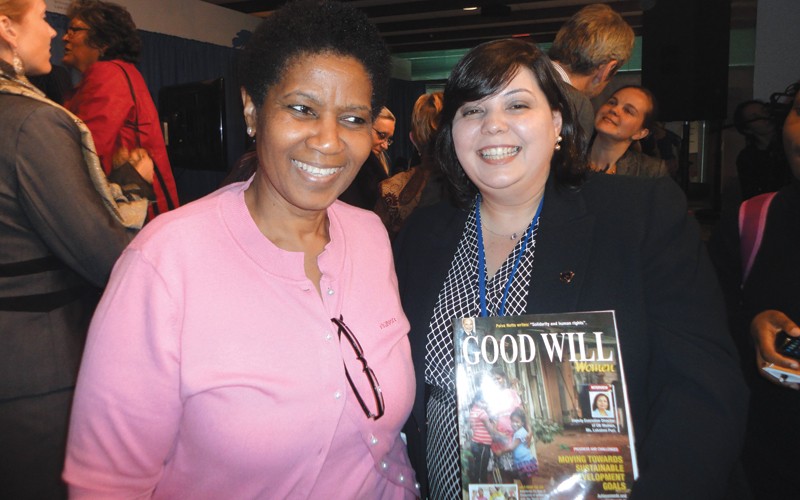
GW — What is the role of South America in this context?
Mlambo-Ngcuka — Latin America and the Caribbean is inspiring in many ways. It has prominent female Heads of State and Government, for example in Argentina, in Brazil, or in Chile, where Michelle Bachelet, my predecessor at UN Women, is President. The region also has the highest levels of representation of women in parliament, with 26 percent. The Americas were also first to enact a binding regional instrument to prevent, punish, and eradicate violence against women and girls, the Belém do Pará Convention, in 1994. This powerful regional Convention served as the basis for the regional instrument of the Council of Europe on preventing and combating violence against women and domestic violence, [also known as] the Istanbul Convention, which just entered into force last year. Latin America and the Caribbean has also made significant strides as regards reparations for victims of sexual violence in conflict, peace, and security. In Colombia, for example, civil society, supported by UN Women, successfully advocated for stronger gender analysis and greater representation of women in the peace talks between the government and the FARC [Revolutionary Armed Forces of Colombia].
GW — The Legion of Good Will defends that gender issues should be strengthened in school curricula. In your opinion, what would be the best strategy to make educational practices more sensitive to gender issues?
Mlambo-Ngcuka — I commend the Legion of Good Will for the emphasis it places on strengthening the gender sensitivity of educational practices. Like you, I firmly believe that gender perspectives in education must be strengthened. The question we must ask is how we do this for maximum and sustainable impact. Strengthening gender sensitivity in education is not about adding on a gender component to processes and strategies that are inherently gender-biased. For example, it is not enough to increase the number of female teachers if there are no efforts to fundamentally transform how they teach and to revise the curriculum to offer equal learning opportunities for boys and girls. Similarly, increasing the enrolment of girls in courses that remain tailored towards boys’ interests will not achieve the desired results. We must revise our curricula and methods of instruction, provide school facilities that are responsive to both girls’ and boys’ needs, and ensure the safety and security of girls in education. We must also find girl-friendly ways of teaching science, technology, engineering and mathematics (STEM) so that on leaving school girls are appropriately prepared to compete in a market that is increasingly geared towards jobs in science and technology. This is crucial if we are to retain the interest of girls and women in education so that they can stay in school longer and graduate with relevant skills.
